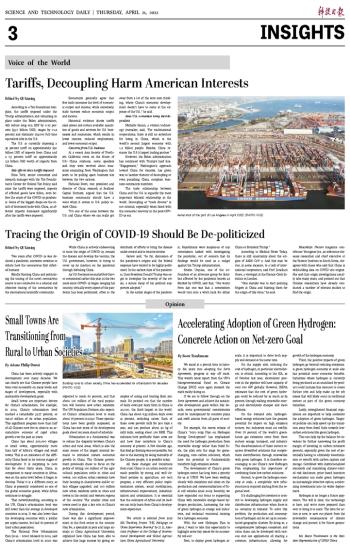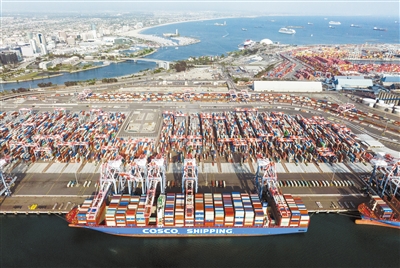
 |
| Aerial shot of the port of Los Angeles in April 2022. (PHOTO: VCG) |
According to a Tax Foundation template, the tariffs imposed under the Trump administration and remaining in place under the Biden administration, will reduce long-run GDP by 0.22 percent (55.7 billion USD), wages by 0.14 percent and eliminate 173,000 full-time equivalent jobs in the U.S.
The U.S. is currently imposing a 25 percent tariff on approximately 250 billion USD of imports from China and a 7.5 percent tariff on approximately 112 billion USD worth of imports from China.
Side effects since tariffs imposed
Erica York, senior economist and research manager with the Tax Foundation's Center for Federal Tax Policy, said since the tariffs were imposed, imports of affected goods have fallen, even before the onset of the COVID-19 pandemic. Some of the biggest drops are the result of decreased trade with China, as affected imports decreased significantly after the tariffs were imposed.
Economists generally agree that free trade increases the level of economic output and income, while conversely, trade barriers reduce economic output and income.
Historical evidence shows tariffs raise prices and reduce available quantities of goods and services for U.S. businesses and consumers, which results in lower income, reduced employment, and lower economic output.
Concerns from U.S. business
At a recent Asia Society of Northern California event on the future of U.S.-China relations, some speakers said they were worried about measures emanating from Washington that seem to be pulling apart business ties between the two nations.
Nicholas Borst, vice president and director of China research at Seafarer Capital Partners, argued that the U.S. business community should have a voice when it comes to U.S. policy toward China.
"It's one of the areas between the U.S. and China where we can really get away from a lot of the zero-sum thinking, where China's economic development doesn't have to come at the expense of the U.S.," he said.
Sino-U.S. economies being interdependent
Michelle Quinn, a veteran technology journalist, said, "For multinational corporations, there is still no substitute for being in China, which is the world's second largest economy with 1.4 billion people. Besides, China remains the U.S.'s largest trading partner."
However, the Biden administration has continued with Trump's hard line. "Engagement," Washington's approach toward China for decades, has given way to harsher rhetoric of decoupling or even punishing China, complain business community members.
The trade relationship between China and the U.S. is arguably the most important bilateral relationship in the world. Decoupling or "trade divorce" is not rational, especially when faced with the economic recovery in the post-COVID-19 era.


 Next
Next




